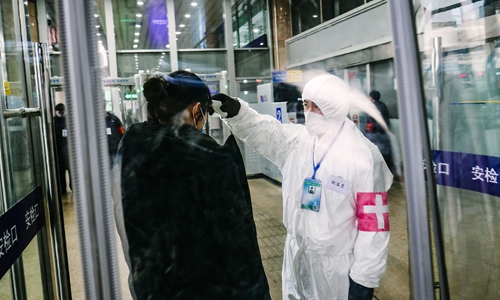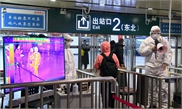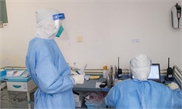IN-DEPTH / IN-DEPTH
Traveling through China amid coronavirus outbreak

A passenger has her temperature taken at the Beijing West Railway Station on January 25. Photo: Li Hao/GT
In my trip during the return travel rush at the end of the Spring Festival holiday, tightened preventive measures for the novel coronavirus-related pneumonia at checkpoints across different provinces made me feel the determination of China's battle against this deadly virus.
In the battle against the epidemic, transport networks have become the first line of defense, especially during the peak travel season at the end of the extended Chinese holiday.
I had my temperature monitored at a toll station at a highway crossing on my way back to Beijing from North China's Shanxi Province. As soon as we reached the toll gate, we could see medical personnel and police in full protective suits doing personnel screening.
The police recorded travelers' residence, ID and phone number information as part of requirements to screen people from high-risk areas.
Vehicles waiting in line were asked to roll down their windows and turn off the heating to avoid compromising the temperature. In almost freezing cold weather, I saw beads of sweat condensed on the frames of anti-epidemic workers' goggles.
A medical worker, surnamed Wu, from a local center for disease control, told me they had been working for more than three hours straight in the winter wind at an open highway junction, but he remained polite and patient to avoid causing more anxiety amid public fear of the outbreak.
At the Qingnianlu subway station in Beijing, I took my third temperature check on my six-hour journey back to Beijing - a wrist temperature monitor before the security check.
Starting from January 24, at least 35 subway stations in Beijing began conducting temperature tests.
However, the city is much quieter than normal partly due to the virus. The subway is no longer as busy as it used to be. Young people in face masks quickly shuttle past each other with little conversation to be heard.
Subway station officers and railway attendants are all required to wear masks. Many ride-hailing drivers and passengers in Beijing also wear masks.
To prevent the spread of the virus, public areas and facilities such as entrances and exits of Beijing subway stations, escalators, self-service machines and public toilets were disinfected three times a day, and station security equipment was disinfected every hour, according to media reports.
Since the Wuhan government imposed travel restrictions on January 23, all operating vehicles in Wuhan, where the virus first broke out, are strictly controlled. Drivers are required to take temperature tests and operating vehicles are sterilized. Carrying passengers out of Wuhan is strictly prohibited, according to Wuhan local government.
The Ministry of Transport announced on January 26 it has opened up a "green track" for material supplies to battle the epidemic in Wuhan. Vehicles carrying supplies will not be inspected, stopped or charged to give priority to the passage of supplies.



